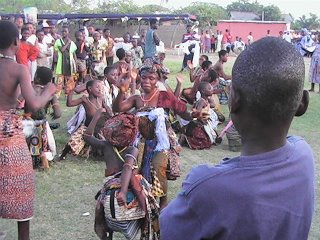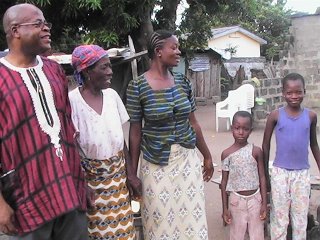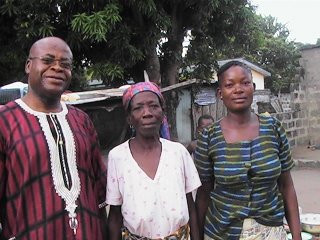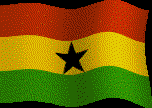Heritage
(excerpt from Countee Cullen's poem)
What is Africa to me:
Copper sun or scarlet sea,
Jungle star or jungle track,
Strong bronzed men, or regal black
Women from whose loins I sprang
When the birds of Eden sang?
One three centuries removed
From the scenes his fathers loved,
Spicy grove, cinnamon tree,
What is Africa to me?
Note: We've had many new readers join us these last few days. If you are one of these, welcome! I invite you to scroll down to the bottom of these posts (seven of them now) and read from the beginning, just to understand where we are now in this journey of self-discovery, sparked by the DNA-based geneaological detective work which has made the journey possible.
Identity
I sat at my cousin Happy's house, sipping a tall glass of cool water in her very pleasant, middle-class home, chatting with her husband, Victor, about African American perspectives on Africa. "So, honestly, what do you think of Ghana so far?" he asked. I said nice things, but their little sideways glances at each other made it clear they thought I was being too nice; too easily glossing over the every day issues - some little; some not so little - that wear Ghana's citizens down: an economy improving just enough to inspire frustrated expectations; power blackouts; mile after mile of streetlights that don't work; a national rail system that no longer works. Lots and lots of things that don't work, or which work poorly, at best. "I've been to America twice," he said, "And I must say, although I know you have your problems, it seemed like God's own country to me over there. Your climate makes people energetic; everything works... at least as far as I could see. And you see how things are with us over here. So, I'm always a little bemused about it when I see African Americans here in Africa with stars in their eyes, you know, looking to move 'back home'. I suppose, really, at bottom, it's an emotional thing, isn't it?"
"Yes," I said. "That's exactly it. Something extremely precious and important was taken from us, and many of us have a real sense of mission about taking it back, you know... a specific ethnic and national identity. You're Ghanaian, and you're Ewe. Your language; your culture; your sense of shared history with each other is rich and deep. You've lived it and breathed it all your life. You've been able to just take it for granted. And even though this is an impossible question for you to really answer, I'm going to ask it anyway: can you imagine what your life might be like if you'd never had any of that self-knowledge?" He looked me soberly in the eye and shook his head. "Listen," I said, "I get it when Africans here tell me, 'Man, you'd better appreciate what you have back there in the States. People never understand how precious political and social stability are until they lose them'. "And there are all kinds of material blessings many of us enjoy that the rest of the world envies. I know that too," I told him. But there are many human wants and needs that material things can never satisfy.
Later that night, another Ghanaian asked me about this issue of identity, and I told him of a newspaper story I once read about a young man from Atlanta whose father was African American and whose mother was native Hawaiian. He was raised by his dad in an all-black, east side Atlanta housing project. He'd always been accepted by his community as black, but many outsiders looked at his reddish-brown skin; his wavy hair; his nose; his eyes; and thought he must be Latino... or maybe partly Asian. He never worried much about what others thought, and he never had much curiosity about the Polynesian/Hawaiian half of his heritage... until the summer he turned eighteen. All of a sudden, now it mattered. His mother, newly in recovery from years of drug addiction, was suddenly fully available to him for the first time in his life. And he found himself eagerly drinking her in - needing to know her. This led very organically and naturally to a deep desire to know her people, and to meaningfully connect with that side of his heritage.
With his father's full blessing, and his mother's advance work on his behalf, the extended family back in Hawaii prepared a huge welcome for him. Over a hundred people, mostly blood relatives, met him at the airport. Even though he spent only two weeks there among them, he had been so immersed in their love and attention that when he returned to Atlanta, he came back feeling very Hawaiian. It's not that he no longer felt black. There was no "either/or" about his situation. His life had changed in a fundamental way, and now his identity was a case of "both/and". If others couldn't understand that and accept it, he figured that was their problem, not his. He understood now that to know the people from whom you come is to know yourself.
That's how I feel today. In this mysterious, wonderful universe of ours - a world in which light is both wave and particle - I claim the right to proclaim myself African American. There's something ambiguous and "squishy" about the definition for many, I know, but not for me. I know exactly what I mean by it. I mean both fully American and fully African. Out of simple respect, I make a point of never, ever arguing with people's choices about how to define themselves. Your life circumstances and the perspectives which flow from that are your own, so if being an "American of African descent", a "black American", a "Negro" or "colored" or "American" or simply "human" is what suits you best at any given moment, then be that. And know, too, that you have the right to change how you choose to define yourself according to how you feel in any given circumstance, and that when you choose to do so you are being neither weak nor disloyal.
Many different bloodlines meet in me, making me deeply rooted in this American soil. My Cherokee and Creek ancestors had loved and cherished this land for twelve thousand years before my first English forbears turned up here to make their own kind of claim on it. And my African ancestors, whose toil built so much of this country's early wealth; who sacrificed for a brighter future they knew they would never live to see; who willingly shed their blood in every one of this country's major battles, from the struggle for independence from England right up to the present - they paid several times over for my right to this land. This country and every good thing in it, from sea to shining sea, belongs to me. Bought and paid for.
But I've always felt I owed my African ancestors another kind of debt too. They are the ancestors with whom I feel the closest bond, because when I look in the mirror, theirs are the faces I most clearly see. It's the part of my ancestry most clearly visible to others, too, of course, and it's an ancestry that ties me to the land from which they came. So, I have always craved a deep and fluid relationship with that land - as a way to better know both them and myself. When they were wrenched away from their homes, their past was deliberately and cruelly erased. The sacred circle of family and cultural tradition was broken. I had always hoped, from an early age, that one day, I would be able to identify from what parts of Africa they had been torn - to go there, as their living representative, and get to know the places they'd had to leave behind; to look for some meaningful ways to make life a little better for the descendants of the kinfolk from whom they'd gone missing. Those who have been following this blog know that DNA-based geneaology data has made it possible for our family to go further than this - to identify some people in a very specific place who are blood kin on my father's line.
And so, on November 2nd, I went to Ghana to seek them out. And in a parallel experience to the young man from Atlanta whose story I told that night in Ghana, I came back to my home in Minnesota feeling very African.
The book I'm writing will have much more detail on this phenomenon, but for now, just to document and demystify it a little, here's my thumbnail version of what it's like to find yourself...
Turning African in Four Easy Steps
Geneaology - Going to Africa for the first time, not as a tourist, but as a member of a family who are eagerly awaiting you, is all about immersion. I brought a camera and a tape recorder, but hundreds of photos went untaken; hours of video and voice recordings went unmade, because I kept having to put these tools down or give them to someone else's keeping. I could never be the observer for more than a minute or two. I had to BE there - a full participant - in everything. So that was step number one - getting comfortable with finding myself thrown into the deep, deep end of a very deep pool. And if this happens to you, as your level of comfort and familiarity rise, you'll find yourself turning African... because on some deep level, that's exactly who and what you are. Had I been a tourist, I would have stood out like a sore thumb everywhere I went. But seventy-five percent of my waking hours, I was with at least one family member; often with several. It didn't matter whether or not passers -by thought I looked Ghanaian;"blended in" with my surroundings. The fierce love of my new-found family radiated an attitude clearly tangible to anybody who came our way - and it said, "He's one of us... and that's all you need to know."
Climatology - I had always known my body felt more comfortable in the tropics than in a cold climate, but when I moved to Minnesota, my wife, who is a native said, "Quit whining. Just learn to dress for it." I did. And until now, I'd always bought the logic that, by comparison, there's little you can do to make relentless sun and heat more bearable, beyond light-weight clothing and a good hat, maybe. In Africa, with the time to be a traveler, not just a vacationer, I quickly learned that this isn't true at all. Here's what you do:
- Drink lots more water. Seems obvious, I know, but good, potable water is available everywhere you turn in Ghana, even if only from the ubiquitous little plastic bags that every other street vendor sells. Stop frequently, buy some, and drink up.
- Relax, and listen to the more subtle things your body's trying to tell you. Your body knows, long before your brain, that it's time to... 1) slow down all movement and conserve energy; 2) seek shade without consciously thinking about it - like a sunflower just naturally seeks the sun; 3) eat fewer meals, eat less at each meal, and take your cues from what the locals eat - hot and spicy food keeps better, and, paradoxically, it cools you when you eat it... as do all those huge mounds of fresh, luscious, local fruit.
- Start "seeing" the coconut man. His wholesome offering will give you both the liquid refreshment you need and boost your blood sugar too. And here he comes, right on time. Pay him a good price, and then let him chop the coconut fresh for you. Let him lopp off the top, so you can drink the cooling juice released by the blows of his machete. It's a healthy snack and a show, for one cheap price. Stop and have this pleasure often.
Funkology - Defining "funk" can be such an arcane and esoteric thing that I almost don't want to go there. The readers of this blog are a very multi-national, multi-cultural bunch, so not all of you are familiar with the term. If you are, cool - you know what it means to you. If you're not, just think of it as another way of saying "soul." By this I mean...
- The joy of discovering all the many little things you know without knowing how you know... like somehow knowing how to play your proper part in a ceremony offering libations to the ancestors without having been coached beforehand... like learning to move fluidly and without fear, as do the Africans around you, across eight lanes of insane traffic... like knowing how to move on the dance floor, even if this particular dance is not familiar... like knowing which mango off the tree is the very one, perfect and ripe, that was meant just for you... like quickly developing an ear for languages you've never studied, such that you move from being the butt of a joke within your earshot (a joke about awkward foreigners) to being in on the joke - even if everybody knows you didn't really get it all.
- "Snap"ology. Ghanaians finish a handshake with "the snap." You let your middle finger hook onto your friend's and linger there for a beat as your hands withdraw, and then, hands separate now, but close enough to still touch, a loud finger pop puts the exclamation point on a proper greeting. For the first two weeks, most Ghanaians I met assumed from my body language as I offered my hand that I wouldn't know "the snap", so it wasn't offered. Just a western-style shake. But by my third week, my body language must have thoroughly changed, because I got "the snap" without hesitation, everywhere I went. Something subtle in the way I move through the world had changed. I met some women at a cafe who had whiled away a little time by guessing, among themselves, where I was from. "We were sure you were diasporan," one said, "But no one thought, 'U.S.' The bet here was Jamaican."
Geography - (sorry; no clean way to add an "ology" to this one) But this one's big. I keep talking about the land because somehow every subject - identity, history, ethnicity, geneaology, politics, economics, and even spirituality - keeps leading back to it. When I was a boy, one of my peak experiences in terms of the development of my idea about who I am came when my grandmother took me out in the North Carolina countryside to meet some cousins who still owned and farmed a major chunk of land on which that part of our family had once been slaves. A cousin about her age took me out with him and we walked that land in silence. That walk was a graduate-level course in African American History and an intense lecture on our family history and identity all rolled into one, sublime hour. Yet during that hour, neither of us said more than five words to the other. There was no need. Our silent, walking meditation imparted a deeper, richer knowledge than language can carry. The day's lesson was, and is, deeply inscribed on my very heart and soul.
So, imagine the depth of my emotion when, forty years later and five thousand miles away, I find myself reliving this powerful, life-altering experience with yet another relative - another man who had been a total stranger up until today; up until... this very moment when we rise from his porch, and he bids me keep pace by his side as we walk his land in silence. This is land worked by his father before him, and by his grandfather's father before him, and Uncle Wakachie says, "You say you think you may buy land around here. Why? You already have this. Build your house here, or over there. Whatever you like."
And we walk the land in silence, in this powerful meditation sacred to fathers and sons; to uncles and nephews everywhere in the world. And I know in my heart that even though I am deeply rooted in the soil of the land where I was born, I have deep roots here as well. And all of it belongs to me - both there and here. And there is no contradiction between these two things. None. We walk this land in silence, but each footfall speaks whole volumes of rich meaning. With each footstep we say, "This... this is mine."
Enough said, for now. See you next week! Be well.

 Tror Na Foe (troh-nah-fway) A phrase in
Tror Na Foe (troh-nah-fway) A phrase in








